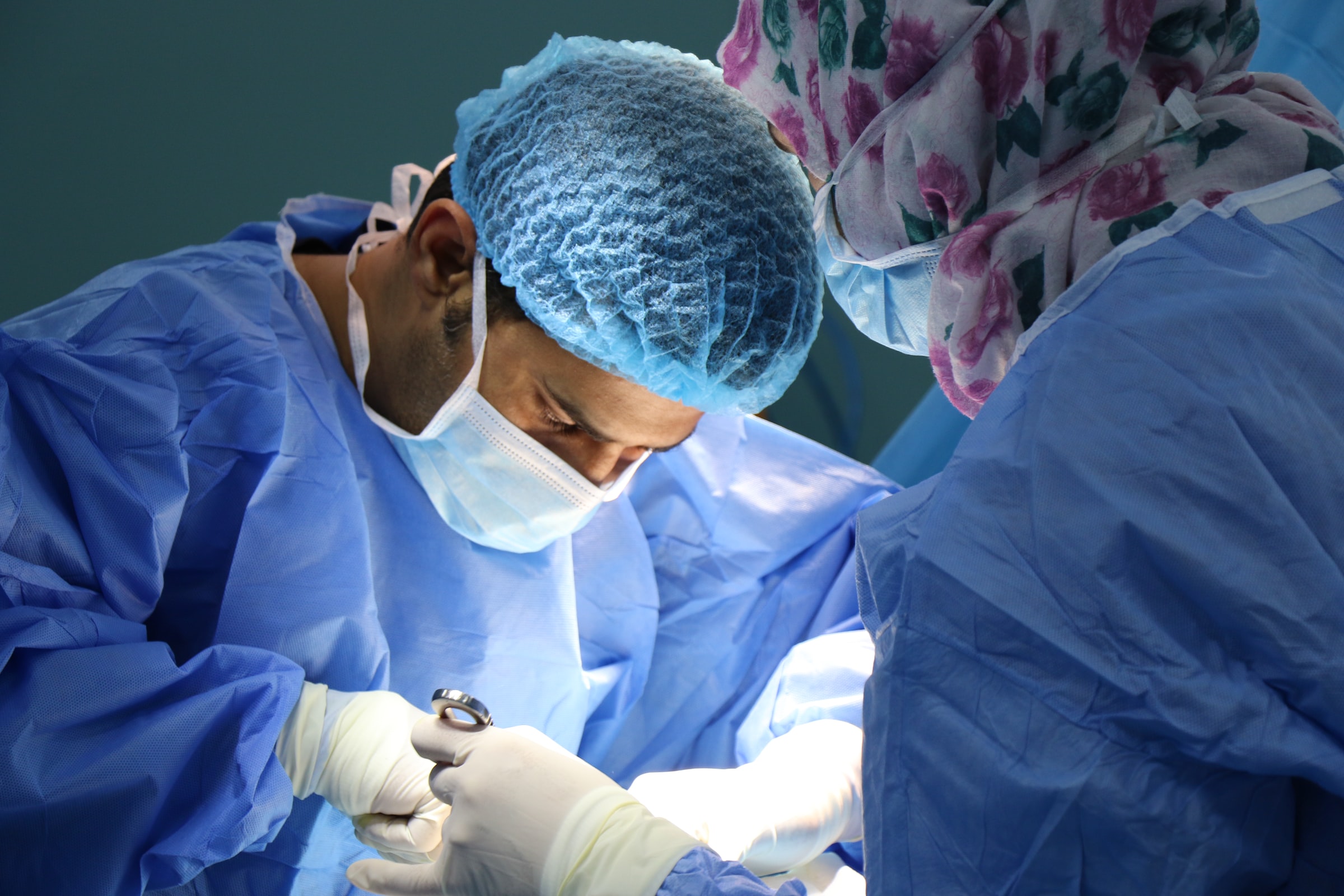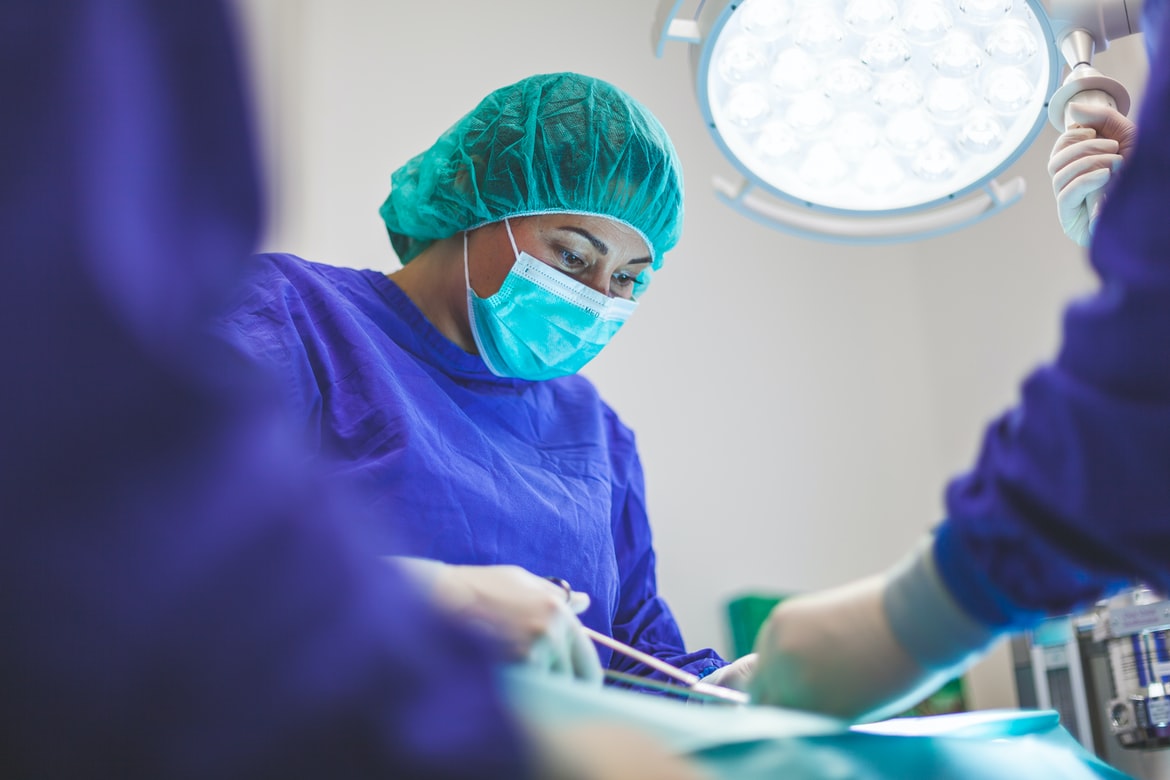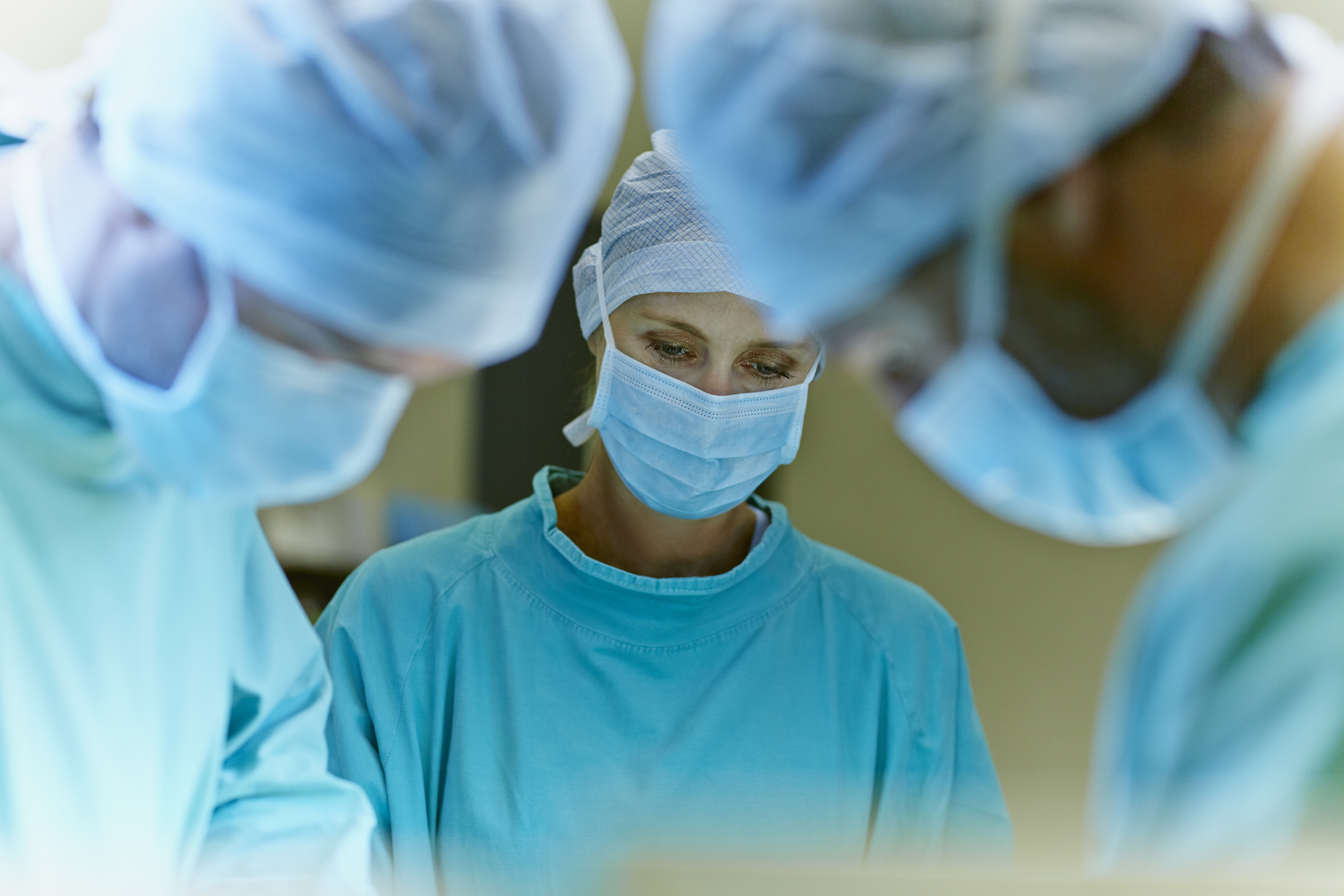
Plastic Surgery ST3 Interview Preparation and Essential Reading 2025
Preparation is key to doing well in the Plastic Surgery ST3 Interview. You will have spent months/years developing your portfolio, however, it only represents a small proportion of your overall mark. Whether you get a Plastics training number or not will depend on how well you answer the questions in your interview. In this post, we will give you some general advice on how to prepare, and we have also developed our Plastic Surgery ST3 Question Bank to help with your revision. High-scoring plastics trainees update our interview question bank every year with new questions based on feedback from the interviews.
Important dates for Plastic Surgery ST3 Recruitment 2025
Important dates to note for 2025 recruitment are as follows:
| Stage | Date |
|---|---|
| Advert appears | 13 November 2024 by 5pm |
| Applications open | 14 November 2024 at 10am |
| Applications close | 5 December 2024 at 4pm |
| Evidence upload portal opens | 17 January 2025 |
| Evidence upload portal closes | 10 February 2025 |
| Self-assessment verification window | 6 March to Friday 7 March 2025 |
| Appeal window for candidates | 11 March to Friday 14 March 2025 |
| Preferences open date | 21 March 2025 |
| Invites to interview | 20 March 2025 |
| Preferences close date | 7 April 2025 |
| Interview dates | 1 April to 2 April |
| Initial offers | 15 April 2025 by 5pm |
| Hold deadline | 23 April 2025 at 1pm |
| Upgrade deadline | 24 April 2025 at 4pm |
| Interview scoresheet release date | TBC |
Plastic Surgery ST3 Application
As you see from the 2025 recruitment dates above, the Plastic Surgery ST3 application process involves the following stages:
-
- Completing your application via the ORIEL system, which includes your self-assessment score (more detail is given about this in the following section).
- Once the evidence portal opens, you’ll need to upload your evidence to justify your self-assessment.
- This will then be reviewed by a team of Plastic Surgery consultants to verify your self-assessment score. This gives your verified evidence score.
- Following this, the highest-scoring applicants will be invited to attend an online interview.
- Your verified evidence score and scores at interview will then be combined to determine your final score and ranking.
Starting Plastic Surgery ST3 soon?
No one wants to be the new Plastics Registrar that all the bosses avoid being on call with. Everyone has to start somewhere, but preparing for the transition can give you the best possible chance of excelling in your new role. Sign up to the Medibuddy Plastic Surgery ST3 Crash Course and take the first step towards becoming a confident and competent Plastics SpR.
Self-Assessment
This part of the Plastic Surgery ST3 application form asks candidates to make a declaration of achievement in various criteria relating to the 2025 person specification. These measurable indicators of achievement are then used to score applicants relative to their level of experience.
The self-assessment section of the application changes slightly every year. Below is the self-assessment guide from the current 2024 application round, which can be used as a guide to help with portfolio preparation:
Competence assessment
You will need to submit evidence of completion or prospective completion of all requisite core surgical competences by post start date as per the 2025 person specification. You can find more information about the 3 possible candidate groups for the competence assessment in the self-assessment and verification guidance.
MBBS (or equivalent)
Pretty straight-forward, but you must list your primary medical qualification in the Entry Qualifications section.
MRCS
You must achieve full MRCS – Part A and Part B – by offer date. You should indicate on your application form whether you have full MRCS or if you intend to successfully complete the exam by offer date.
Years in Practice
A maximum of 6 points will be awarded for this section of the self-assessment:
| Years in Practice | Score |
|---|---|
| <5 | 6 |
| 5.1 – 7 | 4 |
| 7.1 – 10 | 2 |
| >10 | 1 |
Clinical Knowledge and Experience
There are 24 points across the following three domains:
| Domain | Maximum score (points) | Weighting | Total maximum points awarded for section |
|---|---|---|---|
| Surgical Competence – Hand Trauma | 3 sub sections of 4 points each | x(2/3) | 8 |
| Surgical Competence – Burns | 2 sub sections of 4 points each | x1 | 8 |
| Surgical Competence – Skin Cancer | 4 | x2 | 8 |
Academic/Management/Teaching Achievements
There are a maximum of 38 points across the following domains:
| Domain | Maximum score (points) | Weighting | Total maximum points awarded for section |
|---|---|---|---|
| Management and Leadership Experience | 4 | x1 | 4 |
| Higher qualifications directly related to Medicine | 4 | x2 | 8 |
| Higher qualifications not directly related to Medicine | 4 | x1 | 5 |
| Audit | 2 (An extra point can be awarded by the verification panel if they feel the audit presented has significantly improved patient care or has significant merit.) | N/A | 2 (An extra point can be awarded by the verification panel if they feel the audit presented has significantly improved patient care or has significant merit.) |
| Teaching and Training | 4 | x2 | 8 |
| Publications | 5 | N/A | 5 |
| Presentations/Posters | 4 | N/A | 4 |
| Collaborative research | 1 | N/A | 1 |
| Principle Investigator | 1 | N/A | 1 |
Plastic Surgery ST3 Interview
Approximately 100 candidates get shortlisted every year for interview. You should prepare for your interview as you would for an exam. Give yourself plenty of time to cover all the core topics; we recommend 2-3 months, depending on how intensive your preparation is likely to be.
Most of your time will be spent learning the content required for the clinical station. However, it is important that you don’t neglect the OSCE and structured interview. We’ve broken down the stations below with tips on how to prepare for each one.
The 2025 interview will take place online using a system called Qpercom Recruit. The interview will be 30 minutes, with 4/5 panel members. There may also be a lay representative who monitors the interviews to ensure they are all conducted fairly. Check your microphone, camera and connectivity in advance, and ensure your background is clear and that you are in the right environment for an important interview. If you live with friends, tell them when your interview is, so they know not to disturb you. The types of interview questions asked are expected to be similar to previous years, with the exception of the presentation station, which is no longer part of the interview.
Interview Structure
OSCE and Communications
The OSCE is divided into 2 sections and you should prepare for each one separately:
Consent
This station will last 5 minutes. There are only a limited number of core procedures that you are likely to be asked to consent for. Consider all the procedures you have seen registrars perform and prepare your consent for them. We have also produced several scenarios in our interview question bank with example answers to help guide you through your preparation. Here is a picture of our consent dashboard, so you know what to expect when you purchase.
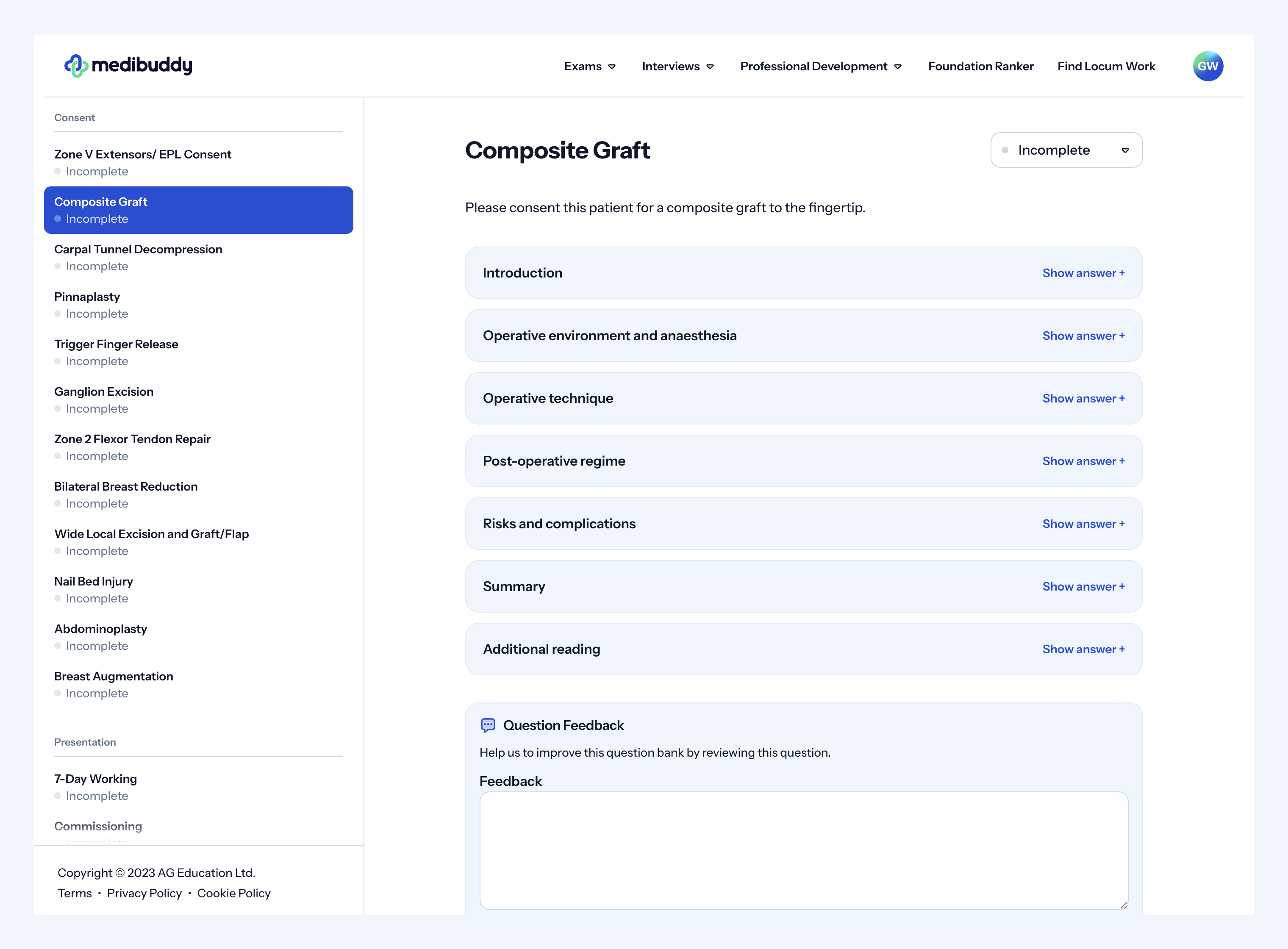
Keeping to time can be difficult in this station, particularly with some more complicated procedures like breast reduction. You should practise consenting on your own and with others until your delivery is slick and concise. We would recommend timing yourself right from the beginning of your revision, as fitting everything in is key to doing well here.
Communication
This part will also be 5 minutes. This station looks at your communication skills when calling consultants to discuss scenarios. There are only a limited number of plastic surgery emergencies, so it’s possible to prepare for them, and we have included these in our interview question bank. It is a good idea to record yourself when working through these practice scenarios, as you can then listen back and see where you need to improve your delivery. Here is an example of a chemical burn scenario from our interview question bank.
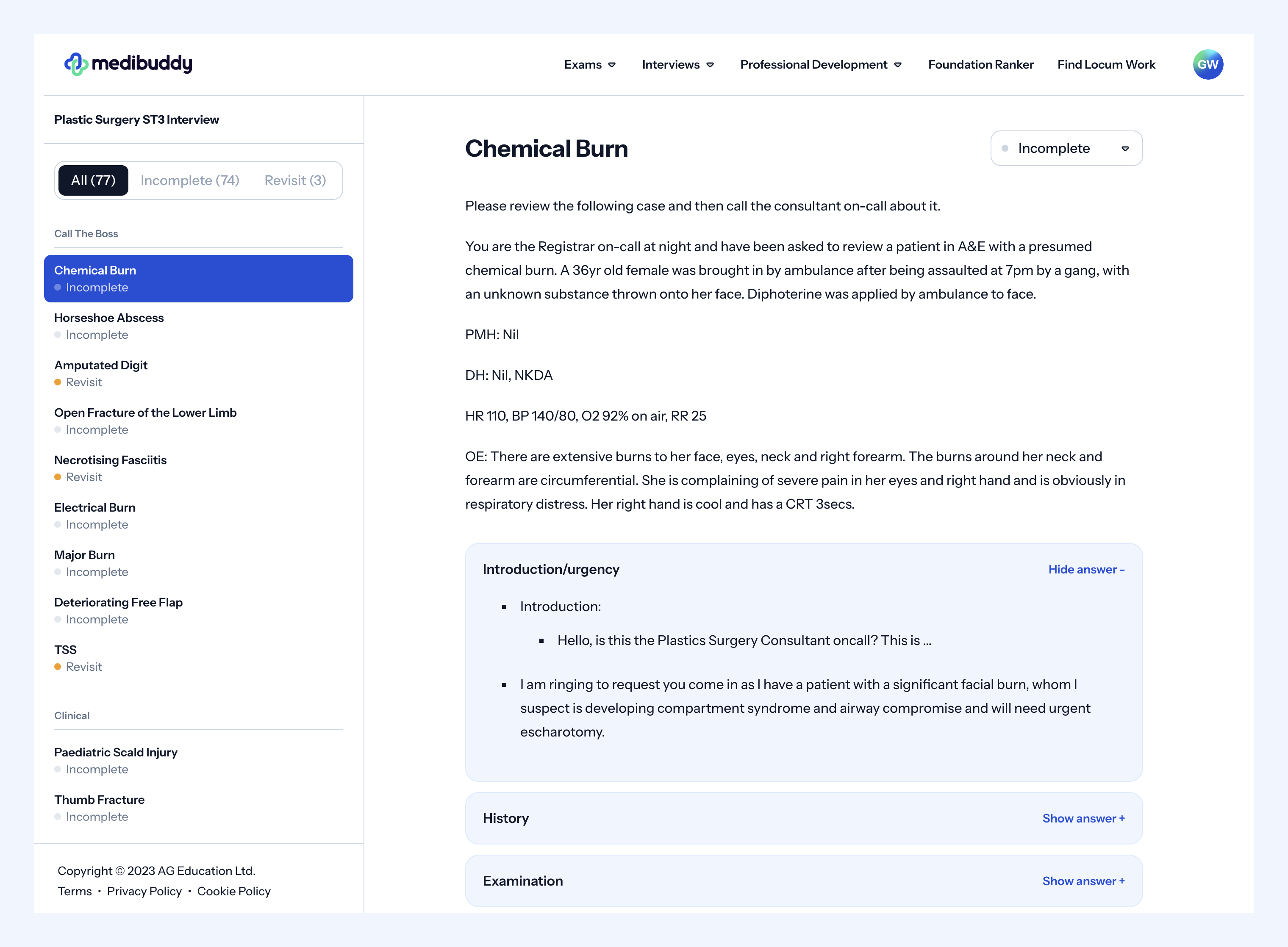
Clinical Scenario
This station lasts 10 minutes, and you will be made aware of 2 clinical scenarios for discussion. The same key topics tend to come up each year in this station and you should make sure you have a good understanding of all of them. You aren’t expected to have FRCS knowledge at this stage, but you should have a good understanding of the diagnosis and management of common plastic surgery conditions.
They will often start with simpler questions such as asking you to describe a clinical image, followed by questions on what you’d ask during the history, what you’d look for on examination and what investigations you would order.
They will form an impression of you based on how you answer these first few questions, so you should repeatedly practise answering them for the core topics. Aim to convey the key points to the simple questions in a clear and concise way. Your goal is to get through them quickly so you can move on to the more challenging questions where you can demonstrate your knowledge.
You should aim to have your clinical knowledge up to scratch early in your interview preparation period and then focus on how you deliver your answers.
As you get more confident, you can ask your registrars and consultants to grill you, although be wary of seniors with a poor understanding of the interview process! Many will ask you questions that are too high a level for the interview, which can be quite demoralising, particularly if the interview is not far off! Here is an example of a clinical interview question from our question bank, so you can get an idea of the level required.
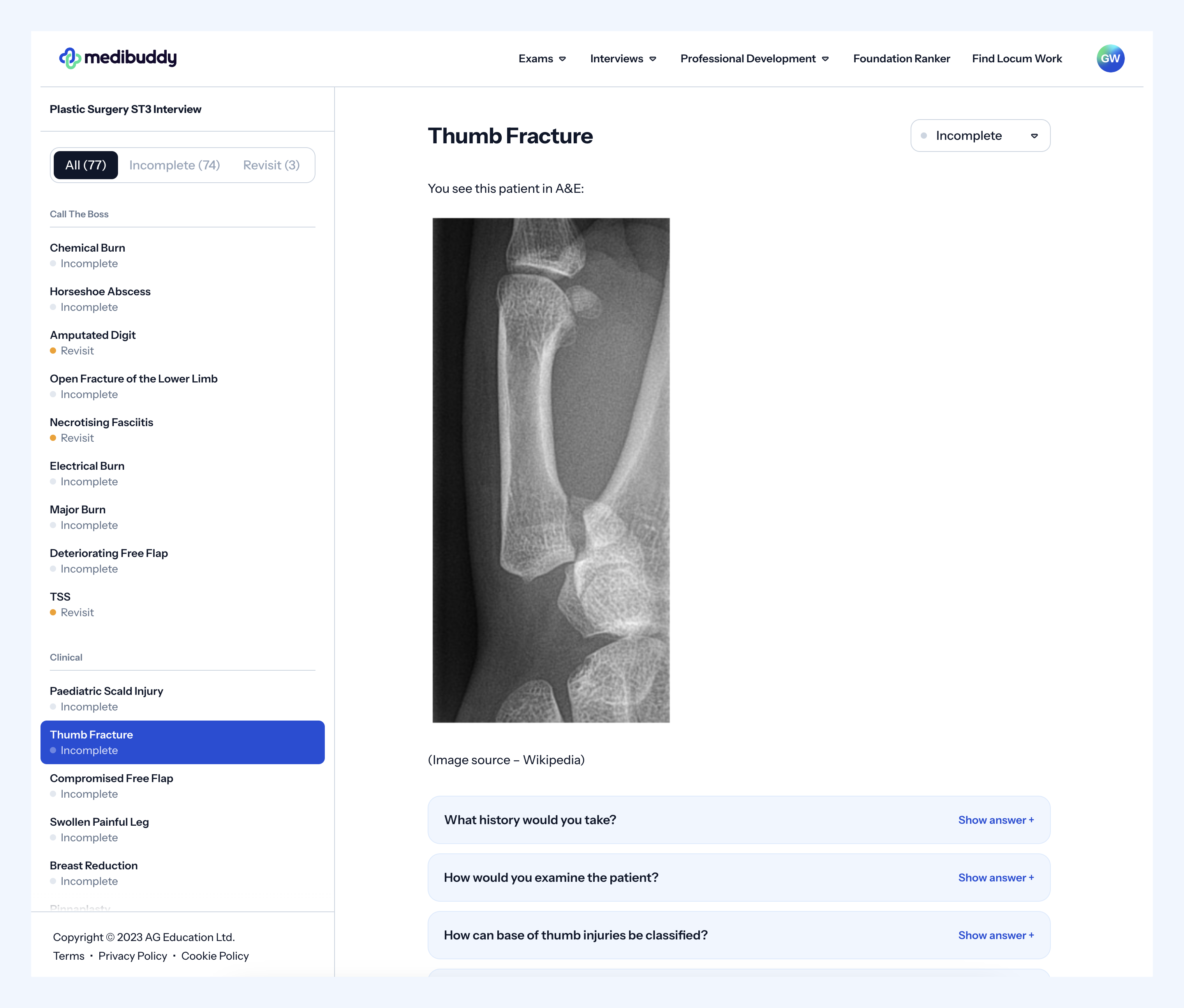
Structured Interview
If you’ve been through core training, you will have had some experience answering similar questions to the ones you will get in the structured interview part. This section lasts 10 minutes. We recommend writing down all your examples and then practising answering questions about audit/leadership/management etc., in small groups.
You should aim to summarise the key aspects of your audit/management roles etc. in roughly 1 minute to 1 minute 30 seconds. This will give you time to move on to the other questions and collect more points.
This station will cover 3 of the following areas:
- Audit
- Research
- Teaching
- Risk and safety
- Management
- Consent
- Ethics
We have updated and enhanced our structured interview questions this year to give you the best support for your interview possible!
Essential Reading
These are some of the resources that we used to prepare for interview. Most of the books can be picked up in hospital libraries. If you have an Open Athens account, the app Clinical Keys can also give you access to many of them.
- Plastic Surgery ST3 Person Specification
- E-LPRAS – This is the e-Learning project for Plastic, Reconstructive and Aesthetic Surgery and can be accessed for free on the e-learning for healthcare website
- Key Notes on Plastic Surgery – You don’t need to know this cover to cover; focus on the key topics and use them to get a broad understanding of the specialty. The first chapter on core principles is particularly helpful for getting to grips with the fundamentals of plastic surgery. If you are a BMA member, you can access a free pdf from the BMA library.
- Essentials of Plastic Surgery – The breast and facial reconstruction chapters explain the principles well and will help you shape your answers in the clinical station.
- Green’s Operative Hand Surgery – This is a good book for learning the principles of the key hand surgery procedures required for interview. You should be able to talk through and explain all the procedures you state you can do in your self-assessment.
We hope you have found this blog useful when thinking about and preparing for your Plastics ST3 interview, and don’t forget to check out our Plastics ST3 Interview question bank, helping you prepare for your interview and get maximum points!
Good luck!
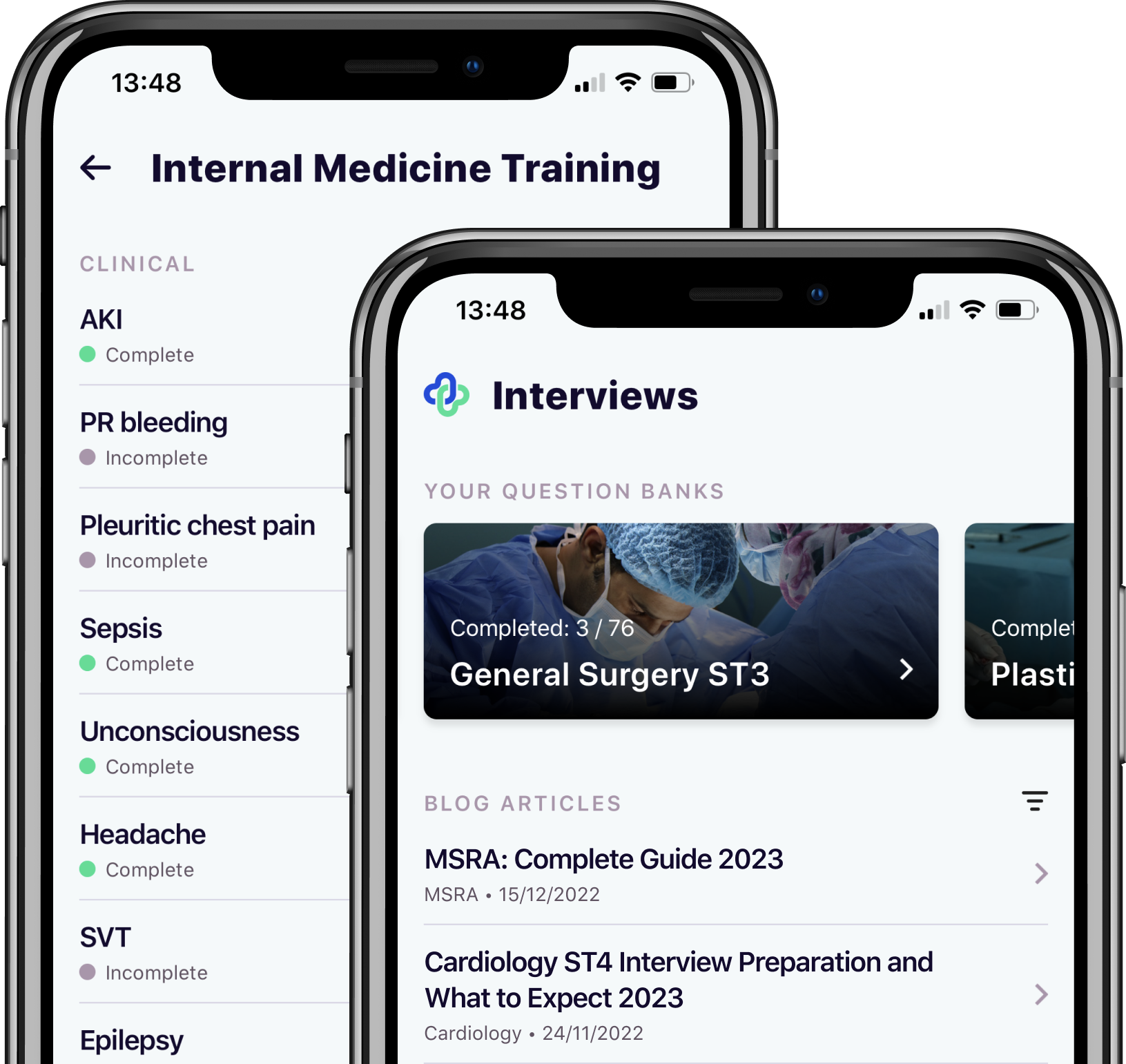
Take your subscriptions with you
Our mobile app allows you to access your interview and exam question banks wherever you are.

